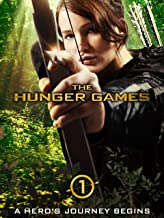Both The Hunger Games and The Road were written closely after the events of 911, an act of terrorism that was caught on camera. Before this, it was rare footage that caught a bombing or other act as it actually happened. But on September 11, 2001 the world watched as the second plane hit and people plummeted from the twin towers before the buildings were engulfed in smoke and part of our humanity was lost on a collective scale as we saw live what mankind could unleash against man. In The Hunger Games, Suzanne Collins shows the theme of humanity within a world of harsh rules, yet within Cormac McCarthy’s postapocalyptic world of The Road, humanity is present where there are no longer any rules.
The world of The Hunger Games is set in an inhumane setting where the totalitarian type victors keep the remaining twelve districts of the continent in a state of subordination enforced by laws and rules, spoken and unspoken. Katniss “learned to hold my tongue and to turn my features into an indifferent mask so that no one could ever read my thoughts” (Collins 6). It’s this type of control, or subjecting others to live in an inhumane world that is at the core of the story. It is Katniss’s humanity that prevails. She goes against the rules and hunts to provide for her family. She takes her sister’s place as tribute. She is a skilled hunter, yet it is not the fear of being killed that shows her humanity; it is the prospect of killing others. According to Jeremy Adam Smith, The Hunger Games “is mainly preoccupied with how human goodness can flourish even in the most dehumanizing circumstances” (1). When Gale tells her “You know how to kill” (Collins 40), Katniss replies, “Not people” (40). Whether she could kill another person is something she reflects on throughout the book.
Katniss’s humanity is taken a step further as she teams up first with Rue, and then Peeta. Smith describes a study that “has revealed that power is wielded most effectively when it’s used responsibly by people who are attuned to, and engaged with, the needs and interests of others” (4). Katniss does, indeed, become a more powerful opponent when she has others to protect. Her show of humanity has another effect. As she sings over Rue’s body and covers her with flowers, she is exhibiting her humanity in the middle of an arena where humanity should not exist in a fight for survival. Katniss’s humanity is what makes her a compelling heroine and the symbol of the Mockingjay. Like Katniss, the man and the boy also show humanity in a hostile world, but in their case, there is no one to witness it or move to compassion.
The world of The Road is set after a catastrophe has destroyed most life. Hunger has driven humans to cannibalism. As Adeline Johns-Putra put it, “the man and the boy are not humans in a dead world as such; they are humans in an inhuman world” (529). Yet the man teaches his son the last vestiges of humanity. The man has instilled in his son that they are the good guys and that they will not eat anyone no matter how hungry they get. Like Katniss, the man’s power comes from caring for another. And also like Katniss he will kill to protect. Johns-Putra calls it “survivalist insularity . . . saving one’s offspring at the expense of others” (532) where the boy has a code of humanity that goes even further as he wants to extend care to others. The boy wants to go back for the child he saw; he wants to save the people in the pantry; he believes that there are more “good guys” in the world where the man no longer believes there are any. The boy believes this even when the only life he has known is full of horror and inhumanity. After they run from the cannibals, the boy asked, “And we couldnt help them because then they’d eat us too” (McCarthy 127), trying to find a reason for the man’s actions to not help.
Johns-Putra explains that “the boy constantly proffers the hope of the existence of other good guys” (533). He sees tracks and says, “They could be good guys. Couldn’t they? (McCarthy 108). He wonders if the people in the bunker could be the good guys. Johns-Putra emphasizes that because of “the unflinching focus on the relationship between father and son, the novel ensures that the contrast between past humanity and present inhumanity pivots on the question of care” (521) To the boy the man’s care is “the standard-bearer for humanity itself, [yet] the boy emerges by the end as an ironic facilitator” (Johns-Putra 521). The man’s belief that there is no humanity left in the world causes him to pass the boy’s salvation. “The attitude of the bearded veteran who saves the boy after the man dies is in keeping with the boy’s ethos of open compassion and in contrast with the father’s code of fiercely guarded filial protection” (Johns-Putra 533). By coming after them, the veteran proves there is humanity left in the world by showing an “interest in the welfare of others beyond kinship” (Johns-Putra 533). His humanity is more in line with the boy’s.
The theme of humanity adds to the popularity of both books as examples of caring for others in a world of terrorism. After September 11, our culture was disrupted. We suddenly knew, seeing it live, that inhumanity existed on a large scale. Like Katniss and the man, distrust of others, fear, and horror became prevalent, yet there were stories shown on the news and social media of heroism. Families of victims and how they were coping were spotlighted. Kind acts were shown. The nation came together. Humanity prevailed during an era of attacks and inhumanity against innocent lives. The Hunger Games and The Road follow in this spirit of caring for others even when survival would dictate that you only care for your own.
Works Cited
Collins, Suzanne. The Hunger Games. Scholastic Inc. New York. 2008 Print.
Johns-Putra, Adeline. “’My Job Is to Take Care of You’: Climate Change, Humanity, and Cormac McCarthy’s The Road.” MFS: Modern Fiction Studies, vol. 62, no. 2, 2016. pp. 519-540. EBSCOhost, search.ebscohost.com/login.aspx?direct=true&db=mlf&AN=2016396341&site=eds-live&scope=site.
McCarthy, Cormac. The Road. New York: Vintage Books, 2006. Print.
Smith, Jeremy Adam. “Five Lessons in Human Goodness from ‘The Hunger Games’” Greater Good Magazine. Berkeley Education. April 18, 2012 https://greatergood.berkeley.edu/article/item/five_lessons_in_human_goodness_from_the_hunger_games
images from Amazon




